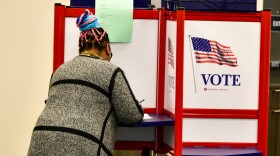Falcon takes Flight, a wing of Falcon Theater, performs to a full house at the Newport Branch of the Campbell County Public Library by presenting poems with the theme of what it means to be human.
The group known for its dramatic readings was asked to perform as a kickoff to the Smithsonian Institution’s traveling exhibit, Exploring Human Origins: What Does it Mean to Be Human?
Clint Ibele, director of this evening’s presentation, said he contacted seven poets from this region and asked them to submit poems that would reflect the exhibit’s theme. Ibele said different voices, including teachers, ministers, and the public, will have thoughts about the exhibit.
“ I wanted to hear from the artistic community, their interpretation, which would give a somewhat unique perspective through these different authors’ work,” explained Ibele.
After getting input from the seven authors whose work is featured, Ibele suggested the title of the presentation.
“By using sort of a combination of their suggestions, I proposed calling it (Un) with the parentheses and then Common Ground, which suggests that which makes us unique as well as that which we share in common," said Ibele.

Programming and community engagement manager at the Campbell County Public Library, Amy Carroll, said the library can display Exploring Human Origins due to a partnership with the Smithsonian and the American Library Association. Carroll said the exhibit includes display panels, interactive kiosks, and a life-sized Neanderthal mother and child statue.
“It explores evolution and it’s coming from the perspective of what does it means to be human. The goal is to have a respectful community conversation around the theory of evolution and just what people think it means to be human. It shows the timelines and the skulls of early humans and what that evidence looks like. There are several programs that are also attached to it that are going to delve deeper into the question,” said Carroll.
Carroll said the library has a long-standing relationship with Falcon Theater. She likes the idea of poetry as an introduction and said the poets submitted their work before seeing the exhibit.

Standing in the middle of Exploring Human Origins, actor Anna Hazard, who is reading some of the poetry tonight, said the exhibit creates a little bit of a museum-type maze in a very small space.
“You can kind of go through in whatever order you like, but you go through different topics of human evolution. It just kind of guides you through different areas of thought and different discoveries, different changes that have evolved over time. There’s interactive pieces with QR codes. There’s a couple of screens that have interactive opportunities. It’s really like a mini museum in a library,” said Hazard.
“I really like the timelines and seeing how recent human history is in the grand scheme of things, I think we lose sight of that sometimes that we’re still pretty new in the grand scheme of time, like capital T, Time. Just seeing it’s not even been a million years since we’ve started gathering around a hearth,” explained Hazard.

After walking through the exhibit, David Derringer and Worley Stidham said there were several takeaways.
“Even though there are lots of differences in terms of shapes of the skull, in terms of how people ate and what kind of food they ate, depending on where they were in the world, there are a lot of similarities as well. Emotions and feelings haven’t changed. People still find joy. People still feel sadness. People still want love. Those things that make us human, the things that make me enjoy the arts, has transcended time and transcended culture,” said Derringer.
"It does make a person feel small, but in a good way. It's good to be reminded that you're not alone, that you're standing on the top of a huge mountain. You're standing at the very end of a long line of people. It's crazy to think that thousands and thousands of generations eventually led to your family and you. You have to imagine what your great, great, great times a hundred, times a thousand grandmother or grandfather would think of domesticated animals and freeways and fast food," said Stidham.

The theater group Falcon Takes Flight spent nearly an hour sharing dramatic readings of poems based on the exhibition’s theme. Campbell County poet Nancy Jentsch wrote two of the poems read this evening. The poet said she was a German teacher for 37 years at Northern Kentucky University and felt honored to have her work included in this performance. Both of her poems presented have to do with language. She recalls her first poem read, called Origin’s Song.
“Talking about the very origins of the species and the inability of language to define what it is that makes us human,” said Jentsch.

Exploring Human Origins opened May 29th at the Newport Branch of the Campbell County Public Library and is expected to be on display until August 1st. The exhibition is free and open to the public.
**Public Media funding is under threat. You can help! Join WEKU's 1850 campaign for the future! 1,850 new supporters, each giving $10 monthly to keep WEKU strong. Donate today!







